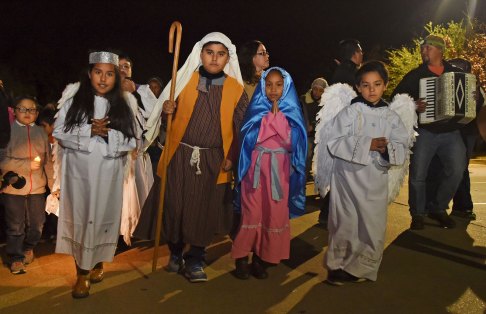Las Posadas, Pride, and the Holy Family

Xavier Montecel
Today’s reflection for the Feast of the Holy Family is by Xavier Montecel, Visiting Assistant Professor of Religious Ethics at Fairfield University, Connecticut. For previous Bondings 2.0 posts by this author, click here and here.
My family has been celebrating las posadas for almost as long as I can remember. I grew up in San Antonio, Texas, the youngest of two sons in a half-Mexican and half-Ecuadorian family. My mother saw to it that we were raised Catholic, and las posadas were the highlight of our rich and faith-filled upbringing.
For my Latino family and our community of loved ones, las posadas began several weeks before Christmas. Our family and two others would each host a posada in their homes – nights filled with laughing, singing, eating, and drinking. This was the chance for everyone to be together: aunts and uncles, cousins, padrinos, and a wide group of cherished friends. It was in this environment – filled with the sound of maracas and guitars and the smell of tamales, rice, and beans – that I first met the Holy Family, whose feast the church celebrates today.
Traditionally, in Mexico and other parts of Latin America, las posadas involves a procession of families from home to home, finishing at the local parish church. Two figures, dressed as Mary and Joseph, would travel with the group, seeking shelter at every door and joining in a responsive folk song. In our case, there was no travelling through the neighborhood. Instead, we would enact the traditional procession inside each home on at least three separate nights.
As children, we took our dramatic roles in these retellings of the Christmas story quite seriously. Dressed in costumes made of old bedsheets, each of us took pride in playing our part. I was almost always a shepherd. One of the older brothers was always the angel. The only girl in our company of friends and siblings – God bless her – served as Mary. All bunched together, we would stand outside the patio doors, candle wax dripping on our fingers, seeking admission to the house in song:
En el nombre del cielo, os pido posada, pues no puede andar, mi esposa amada […] No sean inhumanos, dennos caridad, que el dios de los cielos, se lo premiará.
(In the name of heaven, I ask for refuge, for my beloved wife cannot travel […] Don’t be cruel, show us kindness, for the God of heaven will reward you).

Now, as an adult Catholic and a professor of theology, I think often about hospitality. It is always a major theme in my teaching. It has been a major theme in my intellectual development as a Christian ethicist. But hospitality is far from a purely academic idea for me. It has become, over the years, a core element of my identity as a gay Catholic, as a queer person in a church and society that is all too often not hospitable.
In 2019, I travelled to New York City with my husband and three of my very best friends to celebrate World Pride. It was three days of raucous, spirit-filled celebration. The island of Manhattan overflowed to bursting with LGBTQ+ friends and family. I had never experienced anything like that in my life. In fact, the experience was so overwhelming that one afternoon, as we rode the subway back to our rented apartment in Queens, I began crying and couldn’t stop.
I didn’t quite understand my tears then, but soon it became clear. I had witnessed the world around me transformed. For two days in New York City, the entire world was queer. The world was my world. It was my home, and I was welcoming my straight friends into it as guests. It was a transcendent experience, but also a painful one because I realized that in my ordinary life, I felt like a stranger in my own home: a queer traveler in a straight world. The ability to show hospitality, precisely as a queer person, rather than begging or demanding it, touched me deeply.
I am a person of immense privilege. I tremble to think how much deeper runs the vulnerability of many others less fortunate than I. Others who, like me, are perpetual strangers in their own world. Others who travel at the margins of our common life, begging and pushing to be let in where they can. I think of queer people of color, trans folks whose very existence is denied and destroyed. I think of migrants and refugees who suffer and die in great numbers while we debate over the imaginary boundaries between this land and that one. I think of the Holy Family, dressed in bedsheets, waiting not only to be let inside but to be brought to the very center of the home for food and singing.
On this feast day, I think it is worth stating that the Holy Family does not want our idealizations. Nor do they want our veneration. What they want is for us to practice hospitality. They want us to see them in the faces of foreigners, wanders, and travelers – the tired faces of queer people and migrants who are tired of being strangers in their own world. They want us to let them inside our homes and hearts, and to feed them with justice. That is the spirit of the Christmas season which we have only just begun.
—Xavier Montecel, Fairfield University, December 26, 2021




As a cisgendered, heterosexual Catholic, I say to my LBGTQ brothers and sisters, “Bienvenidos!”
And I assure you there are millions of us who welcome you!
This year has been the most disconnected year I can ever remember, facilitated by the isolation of both the pandemic and the heterosexual family. The first part of this article reminded me of my happy childhood memories but the second part touched the social exclusion I experience today.
A Great article. Thank you so much